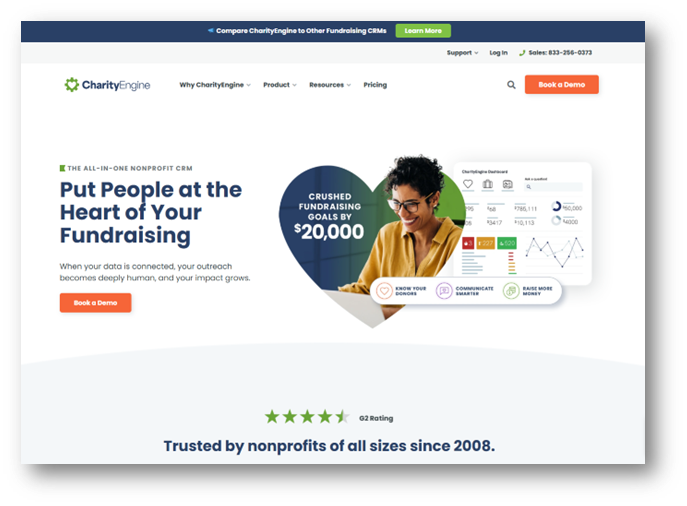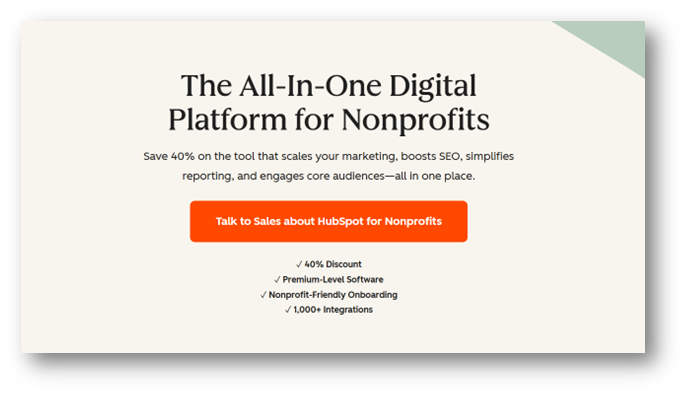%20(18).png)
Mailchimp is one of the most recognizable names in email marketing. It works well for simple newsletters, small lists, and basic automation. But as nonprofits grow, your needs grow with you. You start to rely more on segmentation, donor journey mapping, automation sequences, real-time CRM integration, and multichannel fundraising strategies.
This is often the point where Mailchimp starts to show its limits. It wasn’t designed specifically for fundraising teams, so it doesn’t natively support donor pipelines, structured stewardship journeys, recurring gift upgrades, or fully unified fundraising data. Costs can also climb quickly as contact lists grow, catching organizations off guard once they move into higher pricing tiers.
If your nonprofit is looking for greater control, deeper integration, or a platform built for fundraising, these 15 alternatives deliver stronger functionality and long-term value.
Quick List: Mailchimp Alternatives and What They Are Suited For
-
CharityEngine – Good all-in-one nonprofit CRM with integrated email
-
ActiveCampaign – Good for automation and personalized donor journeys
-
Constant Contact – Good for nonprofits that host many events
-
Mailerlite – Good for affordability and simplicity
-
Moosend – Good for automation at a low price
-
HubSpot – Good for CRM plus email in one system
-
GetResponse – Good for webinars and email together
-
Campaign Monitor – Good for design-focused emails
-
Klaviyo – Good for ecommerce-style automation
-
VerticalResponse – Good for very small nonprofits
-
Brevo – Good for SMS plus email
-
AWeber – Good for strong deliverability
-
Omnisend – Good for multichannel messaging
-
Funraise – Good for email built directly into a fundraising platform
-
DonorDock – Good for tiny teams that need CRM plus email
15 Alternatives to Mailchimp
Let's take a closer look at each of these alternatives.
1. CharityEngine
CharityEngine replaces Mailchimp by providing nonprofits with a single, connected system for a donor CRM, fundraising tools, marketing automation, email, and online giving. All communication and donor activity lives in one place, which eliminates list syncing, CSV exports, and disconnected data.

Why nonprofits choose it:
- Email marketing, CRM, fundraising, and automation in a unified platform
- Personalized donor journeys driven by real-time data
- Built-in segmentation based on actual donor behavior
- No contact uploads or integration issues
- Deep automation for year-end, sustainers, recapture campaigns, and renewals
More value for nonprofits:
Because CharityEngine powers everything from donation forms to email to reporting, nonprofits finally get the full donor picture. This makes year-end, major donor work, and recurring donor growth dramatically more efficient. It also reduces tech stack bloat and lowers total cost of ownership.
2. ActiveCampaign
ActiveCampaign is one of the strongest tools on the market for organizations that want highly customized communication flows. It pulls behavioral, engagement, and on-site activity into its automations.

Why nonprofits choose it:
- Excellent visual automation builder
- Detailed segmentation tools
- Predictive sending and scoring
- Useful for lapsed donor recovery and onboarding
More value for nonprofits:
Organizations that already have a CRM but want more sophisticated email journeys often choose ActiveCampaign. It supports high-volume email, complex branching logic, and data-driven personalization.
3. Constant Contact
Constant Contact is easy to learn and integrates event registration and email in a single tool, making it ideal for nonprofits that host frequent in-person or virtual gatherings.

Why nonprofits choose it:
- Built-in event invitations and registration
- Clear and simple interface
- Nonprofit discounts
- Good deliverability
More value for nonprofits:
It is especially helpful for volunteer-managed communications or teams that need something fast and uncomplicated. Event reminders, RSVP confirmations, and follow-up emails are straightforward to set up.
4. MailerLite
MailerLite provides intuitive email-building tools and basic automation at a lower cost than many competitors.

Why nonprofits choose it:
- Low pricing for large lists
- Clean visual editor
- Solid automation workflows
- Good for newsletters and campaign series
More value for nonprofits:
It is a strong fit for organizations that need a modern email tool but do not have the budget for enterprise-level platforms.
5. Moosend
Moosend includes sophisticated automation tools while keeping pricing accessible, making it an appealing swap for organizations feeling Mailchimp’s cost increases.

Why nonprofits choose it:
- Advanced automation capabilities
- Strong segmentation
- Real-time analytics
- High value for the cost
More value for nonprofits:
It allows nonprofits to build donor journeys and evergreen campaigns without paying for premium tiers. This makes it useful for organizations building out annual fundraising sequences.
6. HubSpot
HubSpot includes a CRM, email marketing, landing pages, automation, and reporting in one place, although its cost can increase quickly.

Why nonprofits choose it:
- Unified contact management
- Clean and visual automation builder
- Strong analytics
- Good free tier to start
More value for nonprofits:
Teams that want a full marketing hub without piecing together multiple tools often choose HubSpot. It is particularly beneficial for nonprofits with large content or education programs.
7. GetResponse
GetResponse offers webinar hosting integrated directly into its email platform, which is ideal for nonprofits that run virtual learning sessions or advocacy trainings.

Why nonprofits choose it:
- Native webinar platform
- Landing page and funnel builder
- Strong automation tools
- Affordable webinar-based pricing
More value for nonprofits:
Instead of using separate webinar software, organizations can run signups, reminders, and follow-up sequences from a single system.
8. Campaign Monitor
Campaign Monitor is known for stunning templates and visually polished emails.

Why nonprofits choose it:
- High-quality design tools
- Simple but effective segmentation
- Easy to collaborate on drafts
- Strong for newsletters and appeals
More value for nonprofits:
Design-focused organizations, museums, arts groups, and storytelling-heavy nonprofits often prefer its clean layouts and intuitive editor.
9. Klaviyo
Nonprofits with online shops or complex behavior tracking sometimes choose Klaviyo for its powerful ecommerce-driven automation logic.

Why nonprofits choose it:
- Data-rich automation
- Dynamic content
- Deep behavior-based segmentation
- Strong tracking for website actions
More value for nonprofits:
It shines for organizations selling merchandise or managing online stores where responsive, behavior-driven email is essential.
10. VerticalResponse
VerticalResponse keeps things simple and offers nonprofit discounts, making it ideal for organizations that need essential email tools without complexity.

Why nonprofits choose it:
- Simple builder
- Straightforward automation
- Good pricing
- Volunteer-friendly interface
More value for nonprofits:
It is a safe and reliable choice for early-stage organizations that primarily send newsletters and occasional appeals.
11. Brevo
Brevo supports multichannel messaging with SMS, chat, transactional messages, and email, all in one platform.

Why nonprofits choose it:
- Text messaging options
- Pay-as-you-go pricing
- Multichannel automation
- Good for urgent communications
More value for nonprofits:
It is helpful for nonprofits that run rapid response campaigns or need SMS for volunteer coordination and alerts.
12. AWeber
AWeber has a strong reputation for deliverability, making it a dependable entry-level tool.

Why nonprofits choose it:
- Excellent deliverability
- Easy to use
- Good customer support
- Strong for appeals and recurring newsletters
More value for nonprofits:
It is ideal for organizations that prioritize reaching inboxes over advanced automation.
13. Omnisend
Omnisend combines email, SMS, and automation in a single interface, which helps nonprofits create cohesive outreach across channels.

Why nonprofits choose it:
- Email and SMS automation
- User-friendly journeys
- Good analytics
- Affordable pricing tiers
More value for nonprofits:
It is especially useful for nonprofits with advocacy, awareness, or campaign-style messaging needs.
14. Funraise
Funraise integrates email into its fundraising system, so donor data stays updated in real time.

Why nonprofits choose it:
- Direct access to giving data
- Real-time donor segmentation
- Great for donor journeys
- Less tool switching
More value for nonprofits:
It works well for organizations that want to simplify their tech stack and keep engagement tied to donor activity.
15. DonorDock
DonorDock offers light CRM tools and email automation for small organizations working with limited staff and budget.

Why nonprofits choose it:
- All-in-one simplicity
- Good for basic donor management
- Easy setup
- Low cost
More value for nonprofits:
It is a solid choice for organizations that want to move beyond spreadsheets without adopting a full enterprise CRM yet.
Choosing the Right Email Tool for Your Nonprofit
Mailchimp is a well-known tool, but it is not built for fundraising teams.
As nonprofits scale, they need deeper segmentation, stronger automation, and unified donor data. The best platform is one that supports donor journeys, reduces manual work, and helps your organization communicate effectively.
Whether you want an all-in-one platform like CharityEngine, advanced automation with ActiveCampaign, beautiful designs with Campaign Monitor, or multichannel outreach with Brevo, there is a better fit for your nonprofit’s next stage of growth.
If you want help choosing the right tool or exploring unified data solutions, we are always here to support you.


.png)

.png)